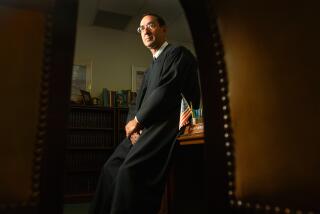Goetz Receives 6-Month Jail Term, $5,000 Fine
- Share via
NEW YORK — A state Supreme Court justice, declaring “general deterrence” should be stressed, sentenced Bernhard H. Goetz to six months in jail and a $5,000 fine Monday for criminal possession of the weapon he used to shoot four young men he claimed were intent on attacking him in a New York City subway.
Goetz, who stood quietly, also was ordered to undergo psychiatric examination and to perform 280 hours of community service. He was placed on probation for five years. Under the terms of the sentence, he will have to serve at least four months before he can be considered for early release for good behavior.
In passing sentence, Justice Stephen G. Crane agreed with prosecutors who argued that Goetz should spend at least some time behind bars.
‘Danger to Citizens’
“I think the only sentence he (Goetz) understands is a sentence with the jail door swinging shut,” Assistant Dist. Atty. Gregory Waples urged the judge. “He is a danger to the citizens of New York.”
“The court has placed great stress on general deterrence,” Crane told Goetz, who wore his customary white shirt and dungarees. “Deterrence is the primary and essential postulate of all criminal law systems.”
“A non-jail sentence for Mr. Goetz would invite others to violate the gun law,” Justice Crane added. “Whether you agree with the law or not, it is the law and was the law on Dec. 22, 1984, and remains the law.”
Barry Slotnick, Goetz’s lawyer, had begged the judge: “Do not, please don’t break the heart of the city of New York. I am asking you to sentence him as if his name was John Doe.”
Just before he delivered his sentence, Justice Crane asked Goetz if he had anything to say.
“No,” he replied. “I have nothing to say.”
Goetz, who could have received up to seven years in prison, will remain free on bail, pending an appeal. On June 16, he was convicted of criminal possession of a weapon in the third degree for drawing and shooting his silver-plated pistol in the subway in 1984. But the jury refused to convict on a dozen other charges, including attempted murder, assault, reckless endangerment and three other gun counts.
Goetz’s sentencing was the latest chapter in a controversial drama that captured national attention. For some Americans, the 39-year-old electronics specialist symbolized the crime-weary ordinary citizen fighting back, shooting four black youths he said were out to mug him in a subway train.
But others came to view Goetz as a psychotic vigilante, whose actions could have put at peril others caught inadvertently in his line of fire. Some black leaders charged the shooting had racial overtones.
In the weeks after Goetz shot and wounded the youths, his actions were debated on radio and television talk shows across the country. He became the subject of books. T-shirt manufacturers tried to cash in on his popularity as the “subway vigilante.” Gun clubs donated money for his defense. Some New Yorkers wanted to give him a medal. The Guardian Angels, a volunteer crime patrol, even presented Goetz with a good luck horseshoe before he went into court Monday.
But in oral argument before Justice Crane, prosecutor Waples stressed jail time was necessary.
Waples charged in addition to his gun conviction, Goetz had burned down a neighborhood newsstand frequented by drug dealers and had burned some of the possessions of a bag lady with whom he had argued. Slotnick denied both charges.
The prosecutor argued that Goetz had tried to buy a gun even while his case was before the grand jury and had walked around with a gun “in blatant defiance of the law” for four years.
“I can’t recall a case . . . where there has been a wider gulf between the myth surrounding the defendant and the cold, hard reality,” Waples said. “This defendant is a sick man. . . . This defendant is dangerous to other members of the New York community.”
“We have no guarantee whatsoever this defendant will not repeat the same offense he committed,” Waples added. “This defendant, your honor, is dangerous when he has a gun and I hope your sentence will disarm him forever.”
In arguing for a far lighter sentence, including community service, Slotnick stressed that for almost three years, Goetz had been a victim of persecution.
“This man should not go to jail. This man has been victimized prior to coming to this court,” the defense lawyer told Crane. “I ask you to treat him as you would treat any other defendant who has suffered in his position.”
In long summary before sentencing, Crane said that care must be taken to avoid the sentencing function being influenced by “high publicity and high passions.”
“The defendant is not free to carry a loaded firearm without a license,” the justice continued. “We learn he has purchased firearms for his friends. He has owned handguns since 1970. He made preliminary efforts to purchase a gun in Florida. . . . Court notes defendant used a quick-draw holster.”
Before imposing the jail term, Crane noted that an analysis of 564 past cases of illegal weapons possession in Goetz’s category showed that 49.2% received prison time.
Even the pre-sentencing recommendations to the court were controversial. Waples labeled “highly irresponsible” any court action “which would unconditionally set (him) loose in the community.”
Different View of Sentence
But New York’s Probation Department took a different view. In its pre-sentencing memorandum, probation officers recommended Goetz receive “intensive supervision coupled with indefinite psychiatric intervention,” but no jail time.
Mayor Edward I. Koch called the sentence “tough” but “correct.”
The legal problems facing Goetz are far from over. He still faces a $50-million civil damage suit filed by the family of Darrell Cabey, the youth most seriously injured in the subway shooting, who remains partially paralyzed with brain damage.
More to Read
Sign up for Essential California
The most important California stories and recommendations in your inbox every morning.
You may occasionally receive promotional content from the Los Angeles Times.












